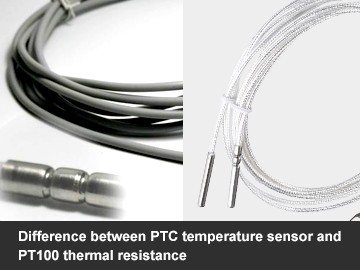Difference between PTC temperature sensor and PT100 thermal resistance
We often hear PTC temperature sensor and PT100 temperature sensor. Although their names look similar, they are actually very different which is mainly reflected in the following aspects.
PTC temperature sensor refers to a thermistor chip temperature sensor with an insulating package. The typical characteristic of the thermistor is that it is sensitive to temperature, showing different resistance values at different temperatures. A positive temperature coefficient thermistor (PTC) has a larger resistance value at a higher temperature and belongs to a semiconductor device. PTC linear positive temperature coefficient thermistor is made of PTC material and physical process. It has excellent stability, complex linearity, repeated one million times, and the characteristic curve is unchanged. PT100 temperature sensor refers to the resistance of platinum thermal resistance temperature sensor made of pure platinum metal. 100 after PT (platinum element) means that its resistance value is 100 ohms at 0 ° C, and its resistance value at 100 ° C is about 138.5 ohms. The temperature measurement is based on the characteristic that the resistance value of the metal conductor increases with increasing temperature. Its main features are high measurement accuracy and stable performance.
In summary, the PTC temperature sensor and the PT100 thermal resistance are both devices that can sense temperature, and play an irreplaceable role in industrial temperature measurement and temperature control.






